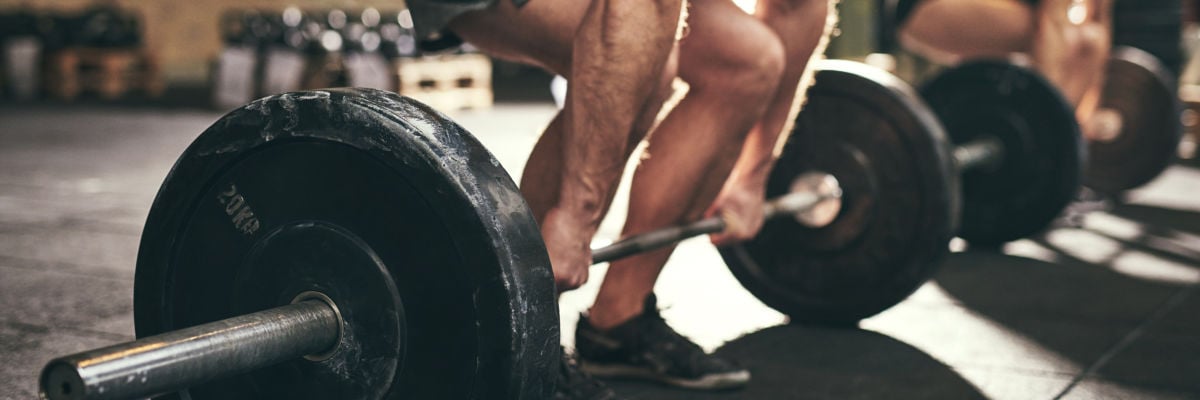
When you’re figuring out how to live a holy life, lifting extremely heavy weights—powerlifting—might not be the first place you’d think to go for inspiration. You might even think powerlifting is vain, an obsession with good looks or superior physical strength as a detriment to personal holiness. But I’m here to tell you that’s all wrong . . . and one of the Church’s greatest saints and minds would agree with me.
I write this piece from experience as an Olympic weightlifter (performer of the overhead lifts called the snatch and clean and jerk), powerlifter (performer of squats, bench presses, and deadlifts), and now, as a would-be strongman senior citizen. Back when I was in second grade, I was mesmerized by a weightlifter I saw on TV (perhaps during the 1968 Olympics). I asked my dad for a set of barbells, and he happily complied. I was “bitten by the iron bug,” as older lifters used to call it, and even today, fifty-four years later, I lift almost every day. (I just heard the voice of my 35-year-old son, who has arrived to hoist barbells and dumbbells in our garage gym. I’ll have to go out in a bit and monitor his form on his heavy sets.)
With that on the table, let’s load up the bar and examine how the lifting of weights, of all things, might help us grow closer to God, to become better stewards of our own bodies, and to better honor our bodily temples of the Holy Spirit (1 Cor. 3:16-17; 6:19-20).
We’ll start by attacking the thoroughly un-Catholic idea that the body is bad. Throughout the millennia, a variety of related heresies, such as Gnosticism, Manicheanism, and Albigensianism, declared the material world, including the human body, evil in its essence, created by an evil god. True peace, freedom, and fulfilment come, so they held, only when we cast off our worldly bodies and live as pure, spiritual beings. The Catholic Church has always begged to differ, noting that early on in the Bible, we are told that everything God created is “good”—indeed, “very good” (Gen. 1:10, 12, 19, 21, 25, 31).
The Church teaches in the Catechism that the soul is “the ‘form’ of the body” and that “spirit and matter, in man, are not two natures united, but rather their union forms a single nature” (365). Further, when Christ returns at the time of the Final Judgment, everyone’s soul will be reunited with his body, and those reside in heaven will be blessed with perfected, “glorified” bodies (997).
As a student of St. Thomas Aquinas, one of my favorite stories of this absent-minded genius is when, as an invited guest at the table of King St. Louis of France, Thomas, deep in thought, forgot where he was, slammed his massive fist on the table, and bellowed, “That will settle the Manichees!” While the other guests were engaging in courtly banter, Thomas was formulating definitive proofs, based on faith and reason, that the human body is good. King Louis took no offense—as a matter of fact, he asked someone to bring pen and paper so Thomas’s insight would not be lost!
Well, Thomas’s insights would prove as prodigious as the man himself as he laid out the nature of the human being—mind, soul, and body—in the second part of his great Summa Theologiae. In his extensive treatment of the virtues, the habits that perfect the various powers of the human soul (like the intellectual virtues that perfect our powers to know and reason, the moral virtues that perfect our powers to do the good, and the God-infused theological virtues that perfect our powers to love God, neighbor, and self), Thomas drew explicit parallels between virtues that perfect powers of the soul and things like health, strength, and beauty that perfect the human body. And that’s where I’m going to zoom in right now, putting strength, for this article, front, center, and, if all goes well, bristling with power for the greater glory of the God who gave us these very bodies.
What about the warning from Joshua ben Sirach, not to lift a weight beyond our strength (Sir. 13:2)? Sure, some people hesitate to do strength training because they picture their untrained bodies helplessly pinioned under some massive load. And yet everyone who has strengthened his body through regular training knows that weights that seem bone-crushing starting out can become powerlifting child’s play a few months or years down the road. We do not lift weights beyond our strength. When we lift weights within our current strength levels, rest, and eat wholesome foods, our strength will rapidly climb.
Okay, but why should a devout Catholic give a hoot if his overhead press or deadlift has gone up? Vanity, after all, is a potentially deadly sin.
St. Thomas explains that when Jesus told us to love God with all we are, and our neighbor as ourself, he commanded us to love our own bodies. In examining the great theological virtue of charity (caritas or love), Thomas tells us we should love our own bodies out of charity. What God has made is good, and we are to use our bodies “as instruments of justice unto God” per Rom. 6:13 (ST II-II, Q. 25, a. 5). Although our bodies cannot know and love God, it is by the works of our bodies that we are able to come to know God. “Hence from the enjoyment in the soul there overflows a certain happiness into the body,” and since the body has a share of this happiness, it can be loved with charity.
One way we can show proper love for our bodies is by making them strong. Powerlifting is one way to do that. Further, the stronger and more energetic we become, having crafted ourselves into virtual “dynamos of charity,” the better able we will be do perform physical acts of love to help our neighbor, be it shoveling an elderly neighbor’s driveway, helping Grandma move boxes into the basement, or playing outside with our children and grandchildren. In fact, this becomes increasingly important the older we get.
So there’s a strong spiritual and a physical benefit to strength training—powerlifting included!—with each one reinforcing the other. When performed carefully, safely, and with a doctor’s okay, sensible strength training in as little as one half-hour session per week can help perfect and maintain our bodily powers for the greater glory of God, before we trade them in for the ultimate upgrade of eternal, glorified bodies in heaven.



